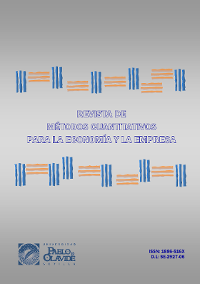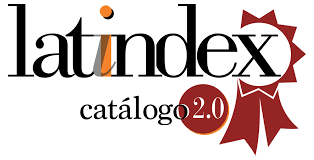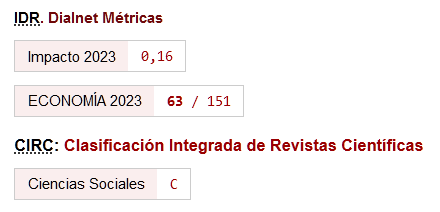La media generalizada híbrida y su aplicación en la toma de decisiones
DOI:
https://doi.org/10.46661/revmetodoscuanteconempresa.2149Palabras clave:
Aggregation operator, OWA operator, generalized mean, weighted average, decision making, operador de agregación, operador OWA, media generalizada, media ponderada, toma de decisionesResumen
En este artículo se presenta el operador de medias generalizadas híbridas. Es un nuevo operador de agregación que generaliza la media híbrida utilizando la media generalizada. Debido a esto, se puede generalizar una amplia gama de operadores de medias, como la media híbrida, la media geométrica híbrida, la media cuadrática híbrida, la media ponderada ordenada generalizada y la media ponderada generalizada. Un aspecto fundamental en este operador de agregación es la posibilidad de utilizar medias ponderadas y medias ponderadas ordenadas en la misma formulación. A continuación, se presenta una generalización mayor mediante la utilización de medias cuasi-aritméticas, obteniendo así la media cuasi-aritmética híbrida. El trabajo termina con un ejemplo de aplicación del nuevo modelo en un problema de toma de decisiones financieras.
Descargas
Citas
Ahn, B.S. (2009) “Some remarks on the LSOWA approach for obtaining OWA operator weights”, International Journal of Intelligent Systems, 24, 1265–1279.
Ahn, B.S. and H. Park (2008) “Least-squared ordered weighted averaging operator weights”, International Journal of Intelligent Systems, 23, 33–49.
Alonso, S., Cabrerizo, F.J., Chiclana, F., Herrera, F. and E. Herrera-Viedma (2009) “Group decision making with incomplete fuzzy linguistic preference relations”, International Journal of Intelligent Systems, 24, 201–222.
Beliakov, G. (2005) “Learning Weights in the Generalized OWA Operators”, Fuzzy Optimization and Decision Making, 4, 119–130.
Beliakov, G., Pradera, A. and T. Calvo (2007) Aggregation Functions: A guide for practitioners, Springer-Verlag, Berlin.
Calvo, T., Mayor, G. and R. Mesiar (2002) Aggregation Operators: New Trends and Applications, Physica-Verlag, New York.
Canós, L. and V. Liern (2008) “Soft computing-based aggregation methods for human resource management”, European Journal of Operational Research, 189, 669–681.
Dyckhoff, H. and W. Pedrycz (1984) “Generalized means as model of compensative connectives”, Fuzzy Sets and Systems, 14, 143–154.
Emrouznejad, A. (2008) “MP-OWA: The most preferred OWA operator”, Knowledge-Based Systems, 21, 847–851.
Fodor, J., Marichal, J.L. and M. Roubens (1995) “Characterization of the ordered weighted averaging operators”, IEEE Transactions on Fuzzy Systems, 3, 236–240.
Herrera, F., Herrera-Viedma, E. and F. Chiclana (2003) “A study of the origin and uses of the ordered weighted geometric operator in multicriteria decision making”, International Journal of Intelligent Systems, 18, 689–707.
Karayiannis, N. (2000) “Soft learning vector quantization and clustering algorithms based on ordered weighted aggregation operators”, IEEE Transactions on Neural Networks, 11, 1093–1105.
Liu, X. (2008) “A general model of parameterized OWA aggregation with given orness level”, International Journal of Approximate Reasoning, 48, 598–627.
Merigó, J.M. (2008) Nuevas extensiones a los operadores OWA y su aplicación en los métodos de decisión, PhD Thesis (In Spanish), Department of Business Administration, University of Barcelona.
Merigó, J.M. and M. Casanovas (2009) “Induced aggregation operators in decision making with the Dempster-Shafer belief structure”, International Journal of Intelligent Systems, 24, 934–954.
Merigó, J.M. and M. Casanovas (2010) “The uncertain generalized OWA operator and its application in financial decision making”, International Journal of Information Technology and Decision Making, 9, (forthcoming).
Merigó, J.M. and A.M. Gil-Lafuente (2008) “The generalized adequacy coefficient and its application in strategic decision making”, Fuzzy Economic Review, 13, 17–36.
Merigó, J.M. and A.M. Gil-Lafuente (2009a) “OWA operators in generalized distances”, International Journal of Applied Mathematics and Computer Science, 5, 11–18.
Merigó, J.M. and A.M. Gil-Lafuente (2009b) “The induced generalized OWA operator”, Information Sciences, 179, 729–741.
Merigó, J.M. and A.M. Gil-Lafuente (2010) “New decision-making techniques and their application in the selection of financial products”, Information Sciences, 180, 2085–2094.
Wang, Y.M. and C. Parkan (2007) “A preemptive goal programming method for aggregating OWA operator weights in group decision making”, Information Sciences, 177, 1867–1877.
Wei, G.W. (2009) “Uncertain linguistic hybrid geometric mean operator and its application to group decision making under uncertain linguistic environment”. International Journal of Uncertainty, Fuzziness and Knowledge-Based Systems, 17, 251–267.
Xu, Z.S. (2004) “Uncertain linguistic aggregation operators based approach to multiple attribute group decision making under uncertain linguistic environment”, Information Sciences, 168, 171–184.
Xu, Z.S. (2005) “An overview of methods for determining OWA weights”, International Journal of Intelligent Systems, 20, 843–865.
Xu, Z.S. (2008a) “Dependent uncertain ordered weighted averaging operators”, Information Fusion, 9, 310–316.
Xu, Z.S. (2008b) “On multi-period multi-attribute decision making”, Knowledge-Based Systems, 21, 164–171.
Xu, Z.S. (2009) Fuzzy harmonic mean operators. International Journal of Intelligent Systems, 24, 152–172.
Xu, Z.S. and Q.L. Da (2002) “The uncertain OWA operator”, International Journal of Intelligent Systems, 17, 569–575.
Xu, Z.S. and Q.L. Da (2003) “An overview of operators for aggregating the information”, International Journal of Intelligent Systems, 18, 953–969.
Yager, R.R. (1988) “On ordered weighted averaging aggregation operators in multi-criteria decision making”, IEEE Transactions on Systems, Man and Cybernetics B, 18, 183–190.
Yager, R.R. (1993) “Families of OWA operators”, Fuzzy Sets and Systems, 59, 125–148.
Yager, R.R. (1996a) “Quantifier guided aggregation using OWA operators”, International Journal of Intelligent Systems, 11, 49–73.
Yager, R.R. (1996b) “Constrained OWA aggregation”, Fuzzy Sets and Systems, 81, 89–101.
Yager, R.R. (2002) “Heavy OWA operators”, Fuzzy Optimization and Decision Making, 1, 379–397.
Yager, R.R. (2003) “E-Z OWA weights”, in: Proc. 10th IFSA World Congress, Istanbul, Turkey, 39–42.
Yager, R.R. (2004) “Generalized OWA aggregation operators”, Fuzzy Optimization and Decision Making, 3, 93–107.
Yager, R.R. (2007) “Centered OWA operators”, Soft Computing, 11, 631–639.
Yager, R.R. (2008) “Using trapezoids for representing granular objects: Applications to learning and OWA aggregation”, Information Sciences, 178, 363–380.
Yager, R.R. and D.P. Filev (1994) “Parameterized andlike and orlike OWA operators”, International Journal of General Systems, 22, 297–316.
Yager, R.R. and J. Kacprzyk (1997) The Ordered Weighted Averaging Operators: Theory and Applications, Kluwer Academic Publishers, Norwell, MA.
Zhao, H., Xu, Z.S., Ni, M. and S. Liu (2010) “Generalized aggregation operators for intuitionistic fuzzy sets”, International Journal of Intelligent Systems, 25, 1–30.
Descargas
Publicado
Cómo citar
Número
Sección
Licencia
Derechos de autor 2010 Revista de Métodos Cuantitativos para la Economía y la Empresa

Esta obra está bajo una licencia internacional Creative Commons Atribución-CompartirIgual 4.0.
El envío de un manuscrito a la Revista supone que el trabajo no ha sido publicado anteriormente (excepto en la forma de un abstract o como parte de una tesis), que no está bajo consideración para su publicación en ninguna otra revista o editorial y que, en caso de aceptación, los autores están conforme con la transferencia automática del copyright a la Revista para su publicación y difusión. Los autores retendrán los derechos de autor para usar y compartir su artículo con un uso personal, institucional o con fines docentes; igualmente retiene los derechos de patente, de marca registrada (en caso de que sean aplicables) o derechos morales de autor (incluyendo los datos de investigación).
Los artículos publicados en la Revista están sujetos a la licencia Creative Commons CC-BY-SA de tipo Reconocimiento-CompartirIgual. Se permite el uso comercial de la obra, reconociendo su autoría, y de las posibles obras derivadas, la distribución de las cuales se debe hacer con una licencia igual a la que regula la obra original.
Hasta el volumen 21 se ha estado empleando la versión de licencia CC-BY-SA 3.0 ES y se ha comenzado a usar la versión CC-BY-SA 4.0 desde el volumen 22.











